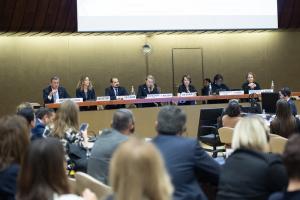
Delegations from over 40 countries in the wider European region convened in Geneva on 19-20 October to review progress towards the goals adopted by the landmark 1994 International Conference on Population and Development (ICPD) and discuss priorities for the future.
The two-day conference, entitled “Population and Development: Ensuring Rights and Choices,” was organized UNECE and the UNFPA Regional Office for Eastern Europe and Central Asia as part of a global review process three decades after the ICPD took place in Cairo.
“As the region continues to face rapid demographic change, now is the time to renew the commitment to ensuring every individual can exercise their rights and freely make choices that allow them to realize their full potential,” said Tatiana Molcean, UNECE Executive Secretary, at the closing of the conference.
She added that in the UNECE region, where population ageing and population decline are the new realities, adapting to demographic change means finding new ways to support individual needs and aspirations across the life course.
“As concerns are on the rise on the effects of demographic change, the principles agreed at the ICPD, and later reflected in the SDGs, serve as a framework for finding constructive, forward-looking and long-term solutions that benefit individuals and societies as a whole,” said Diene Keita, UN Assistant Secretary-General and UNFPA Deputy Executive Director at the opening of the conference.
“There is more that unites us than sets us apart: it is in the interest of every nation to pursue people-centred development because it creates the conditions for healthy, empowered individuals and vibrant, thriving societies,” she added.
Many member States reaffirmed their commitment to the principles agreed at the ICPD and to implementing the ICPD Programme of Action, as well as related international frameworks such as the Beijing Platform for Action.
Delegations welcomed the regional report on the implementation of the ICPD Programme of Action and the priorities identified in the 2013 Chair’s Summary. Many speakers echoed the conclusions of the report, acknowledging the progress made in the region and voicing concern about remaining gaps in implementation and persisting inequalities both within and between countries.
A number of delegations expressed concern about the effects of overlapping crises, including the COVID-19 pandemic and an increasing number of armed conflicts, and about pushbacks against some elements of the ICPD agenda, warning also that progress in some areas has slowed down or is being reversed, and that there was a risk of hard-won gains being lost.
In light of these challenges, participants called for a renewed commitment and global political consensus around the ICPD and its Programme of Action.
Among the over 300 conference participants were ministers and other high-level government officials, as well as parliamentarians and representatives of civil society, academia, international organizations, and youth. The conference was co-chaired by Alexei Buzu, Minister of Labour and Social Protection of the Republic of Moldova, and Ambassador Aurora Diaz-Rato Revuelta, Permanent Representative of Spain to the United Nations in Geneva.
During the two-day conference, participants shared measures they have undertaken to achieve the ICPD goals and discussed gaps and challenges across three main themes: population dynamics and sustainable development; families and sexual and reproductive health over the life course; and inequalities, social inclusion and rights.
The outcomes of the conference will feed into the global ICPD30 review scheduled to take place during the 57th Session of the Commission on Population and Development in April 2024, as well as the 2024 Summit of the Future.
Read the conference highlights
View the regional report
Explore the interactive report